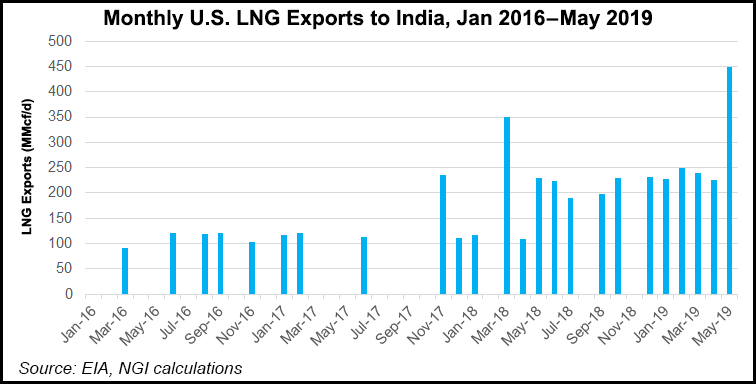Infrastructure | LNG | NGI All News Access
India’s Bharat Planning FSRU for LNG Imports
Indian state-owned Bharat Petroleum Corp. Ltd. (BPCL) said Monday that it is planning to invest around $240 million to build a floating storage and regasification unit (FSRU) at the deepwater port at Krishnapatnam on the east coast.

The FSRU would initially be a 1 million metric ton/year (mmty) terminal, “which can be scaled up to 3 mmty or 5 mmty in the future,” said Bharat Chairman D. Rajkumar. BPCL would hold a 74% interest in the project, while the remaining 26% would be owned by state-run Petronet LNG, India’s top LNG importer. The project could be commissioned by 2022.
India’s first FSRU-based LNG terminal, with a capacity of 4 mmty, was launched late last year at Jaigarh Port on the east coast. The Bharat project would be India’s sixth import terminal and comes as India turns to more LNG consumption for its power, fertilizer and industrial sectors, which cannot be matched by domestic gas production.
An acute domestic gas shortage has also left India struggling to meet its power generation capacity. Gas is expected to make up at least 15% of India’s overall energy mix by 2030 from current consumption of 6.2%. Over the next seven years, the government plans to build another 11 LNG import terminals, mainly on the east coast.
The Indian government has also been working on a national gas grid, adding around 8,700 miles of additional gas pipeline network, also mainly in the eastern part of the country.
India had the third-largest incremental LNG growth of any market in 2018, solidifying its position as the world’s fourth-largest importer of the fuel after Japan, China and South Korea, according to the International Gas Union’s LNG 2019 report.
India’s rise to one of the top global LNG importers has seen it become a reseller of the fuel, in addition to taking the lead in possible contract renegotiations with its suppliers as spot prices for the fuel hit multi-year lows.
The Asia-Pacific region now accounts for around two-thirds of global LNG demand, with consumption projected to increase going forward.
FSRUs, despite limitations in capacity, online loading and technical hurdles, as well as weather challenges, are typically less expensive to build than onshore counterparts and can be built and put in place more quickly.
FSRUs have been instrumental so far in helping several countries, including Pakistan, Egypt, Colombia, Bangladesh and India, ramp up regasification capacity to meet chronic gas shortages.
© 2024 Natural Gas Intelligence. All rights reserved.
ISSN © 1532-1231 | ISSN © 2577-9877 |
